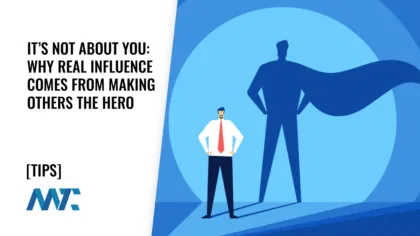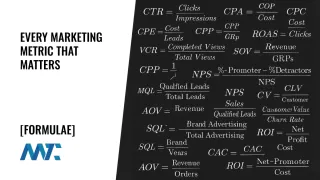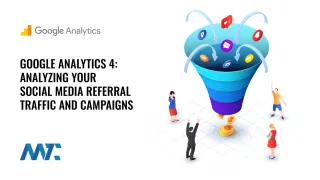It’s Not About You: Why Real Influence Comes From Making Others the Hero

There has never been an easier time to start a podcast, YouTube channel, or social media brand, and never been a harder time to earn attention. Every day, new creators flood the digital world armed with microphones, cameras, and ambition, convinced that if they produce enough content, the world will notice. But most don’t grow an audience. They talk into the void.
The reason is simple: they make themselves the hero of their story. They start their channels about themselves, their opinions, their experiences, and their perspective without realizing that actual influence isn’t declared. It is earned through the act of giving others the spotlight.
That’s not just a lesson for companies. It’s a lesson I learned personally.
Influence Isn’t Claimed, It’s Given
You can’t call yourself an influencer and expect influence to follow. The title doesn’t precede the audience; it follows it. Real influence is not about how much you talk; it’s about how much people trust what you say because of the value you provide them.
I’ve watched friends invest heavily in podcasts, YouTube channels, and social platforms, only to be discouraged when no one listens or watches. They do everything right technically, with great branding and polished production, but their message doesn’t resonate. The reason is that it’s self-centered. They are trying to be the story instead of telling one that others care about.
The same principle applies to brands. Companies that use social media to talk about themselves, how great they are, how innovative they are, and how long they’ve been around end up sounding like they’re broadcasting from an empty room. The audience might glance their way, but they don’t stay, because there’s no emotional room for them inside that narrative.
Joe Rogan and the Power of Making Others the Hero
Joe Rogan is often cited as one of the most influential voices in modern media, not just because of his reach, but because of how he earned it. Yes, he had name recognition long before The Joe Rogan Experience, but his show didn’t explode because he talked about himself. It grew because he didn’t.
Rogan’s brilliance lies in his curiosity. His guests drive the conversation. He listens, he explores, he challenges, and he learns. Every episode positions his guest as the hero of the story, while Rogan plays the role of an engaged narrator, guiding the dialogue but never dominating it. Audiences aren’t tuning in to watch Rogan perform; they’re tuning in to be part of a conversation that feels real, alive, and generous with ideas.
That approach, letting others shine, is the foundation of authentic influence.
What I Learned the Hard Way
When I first started podcasting, I made the same mistake many creators do. I thought success would come from being a compelling host, having something smart to say, and driving every conversation. But my growth didn’t come until I flipped the formula completely.
Before each interview, I began doing deep research on every guest, reading their work, studying their background, and mapping out questions designed to bring out their best insights. Once the recording started, I forced myself to stay quiet, listen intently, and follow where the guest wanted to go, not where I wanted to steer things.
When I did speak, it was to reinforce what I’d learned and to connect their ideas to broader lessons for the audience. The results were immediate. My audience numbers climbed, but more importantly, the engagement deepened. Listeners weren’t tuning in for me; they were tuning in for the people I introduced them to.
That’s when I realized: I wasn’t the story. I was the narrator. The guests were the heroes.
The Same Lesson Applies to Brands
Brands often fall into the same trap as first-time creators. They make their content about their products, their innovations, and their awards. They forget that social media isn’t a press release platform; it’s a storytelling platform.
Successful brands, like successful podcasters, understand their role is to elevate others. Nike doesn’t tell you how great Nike is; it tells you how great you can be. GoPro doesn’t brag about its camera specs; it showcases what users capture with it. Apple doesn’t sell technology; it sells creativity through the eyes of its customers.
In each case, the customer is the hero. The brand is the enabler, the guide, the narrator… helping the story unfold.
Why “Me” Marketing Fails
The reason so many social strategies fail is that people can’t see themselves in the story. When brands or creators make themselves the star, they’re asking for admiration instead of connection. Admiration fades; connection sticks.
Your audience doesn’t want to watch you succeed; they want to feel like they could succeed because of you. Whether you’re an individual creator or a multinational brand, your power comes from making others the protagonist in your narrative.
If you want to grow an authentic audience, one that listens, shares, and stays, start by asking a simple question: Who’s the hero in my story? If the answer is you, you’ve already lost your audience. But if the answer is your guest, your customer, or your community, you’re on the right path.
How to Build Real Influence
Here’s how to make the shift:
- Do the work before you hit record. Whether interviewing guests or featuring customers, research deeply. Know enough to ask meaningful questions and make others shine.
- Listen more than you talk. Your silence gives others room to tell stories that resonate. Listening is what turns content into connection.
- Frame the insight, not the ego. Reflect on what you learn and share how it matters to your audience. You’re the guide translating someone else’s brilliance into actionable meaning.
- Tell stories of transformation. Focus on outcomes, how people grow, change, or succeed through your platform, not how great your platform is.
- Build consistency and humility. Influence grows through service, not spotlight. Keep showing up, keep amplifying others, and your credibility compounds.
The Universal Truth
Whether you’re building a personal brand, a company presence, or a podcast, the principle is timeless. The most influential voices are those that make space for others.
Influencers become heroes when audiences aspire to be like them. Brands build loyalty when customers see themselves as the hero of the story. And storytellers, whether they sit behind a microphone or in a marketing department, earn lasting influence only when they understand that their greatest power lies in helping others be seen.
It’s still not about you. It’s about how well you use your platform to make others the hero, and how naturally your own influence follows when you do.







